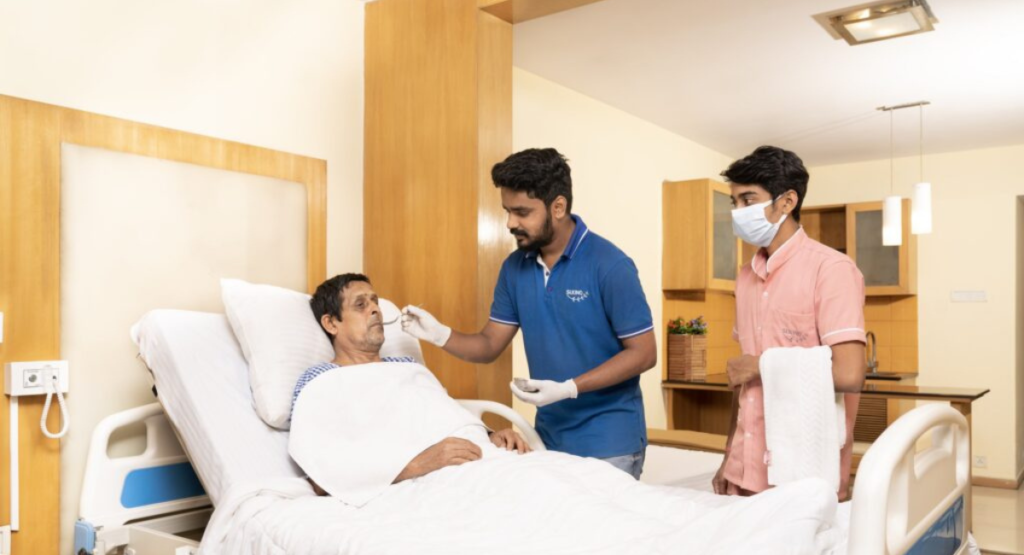End of life care is a topic that often evokes discomfort and avoidance in conversations, yet it’s an indispensable aspect of healthcare that profoundly impacts individuals, families, and communities. As we navigate the complexities of life, it’s imperative to acknowledge the importance of end-of-life care and understand how it can provide comfort, dignity, and support during one of life’s most challenging stages. In this blog, we’ll delve into the crucial role of end-of-life care, exploring its significance in enhancing the quality of life for patients, supporting families, respecting patient autonomy, and promoting comfort and dignity. By shedding light on this vital aspect of healthcare, we aim to foster understanding and compassion surrounding end-of-life care and highlight its importance in providing compassionate and dignified support to those nearing the end of their journey.
Understanding End of Life Care
End of life care encompasses a range of services aimed at providing comfort and support to individuals in the final stages of their lives. It involves medical, emotional, and spiritual care tailored to meet the unique needs of each individual. Transitioning from curative treatment to end of life care marks a shift in focus from curing to providing quality of life and dignity in the final days.
Advance directives play a crucial role in ensuring that an individual’s wishes regarding their medical care are respected, particularly when they are no longer able to communicate them. These legal documents, including living wills and durable power of attorney for healthcare, allow individuals to specify their preferences regarding life-sustaining treatments, organ donation, and other medical decisions. By discussing and documenting these preferences early on, individuals can maintain autonomy and alleviate the burden of decision-making for loved ones.
The Role of Hospice Care
Hospice care focuses on providing comfort and support to individuals with terminal illnesses and their families. It emphasizes pain management, symptom control, and emotional support to ensure a peaceful and dignified end of life experience. Through interdisciplinary teams comprising medical professionals, counselors, and volunteers, hospice care aims to address the physical, emotional, and spiritual needs of patients and their loved ones.
Importance of Emotional Support
Navigating end of life care can be emotionally taxing for both patients and their families. Emotional support, therefore, plays a pivotal role in alleviating distress and promoting well-being during this challenging time. Whether through counseling, support groups, or one-on-one interactions, providing a compassionate presence can offer comfort and reassurance to those facing the end of life.
Significance of Home-Based Care
For many individuals, the familiarity and comfort of home hold profound significance, especially in the final stages of life. Home-based end of life care allows patients to remain in familiar surroundings surrounded by loved ones, promoting a sense of peace and tranquility. Through home healthcare services, individuals can receive medical attention, personal care, and emotional support tailored to their needs while maintaining a sense of autonomy and independence.
Ethics of End of Life Care
Ethical considerations play a central role in end of life care, guiding healthcare professionals, patients, and families in making decisions that uphold dignity and respect for individual autonomy. Discussions surrounding euthanasia, palliative sedation, and withdrawal of life-sustaining treatments raise complex ethical dilemmas that require careful consideration of values, beliefs, and cultural perspectives. By engaging in open and honest dialogue, stakeholders can navigate these ethical challenges while honoring the inherent worth and dignity of every individual.
Finding Solace in Spiritual Care
Spiritual care addresses the existential and spiritual concerns that arise at the end of life, offering comfort, meaning, and hope to individuals and their families. Whether through religious rituals, prayer, or existential discussions, spiritual care aims to foster a sense of peace and acceptance in the face of mortality. By attending to the spiritual dimensions of the dying process, individuals can find solace and transcendence amidst life’s most profound transitions.
The Legacy of Compassionate End of Life Care
End of life care extends beyond the individual, leaving a lasting impact on families, communities, and society as a whole. By providing compassionate and dignified care to those nearing the end of life, we affirm the inherent value and worth of every human being. Through acts of kindness, empathy, and support, we honor the journey of life and ensure that its final chapter is marked by love, dignity, and respect.
Advocating for End of Life Care Awareness
As we reflect on the importance of end of life care, it becomes evident that open and honest conversations are essential in promoting awareness and understanding. By breaking the silence surrounding death and dying, we can empower individuals to make informed choices about their end of life care preferences and engage in meaningful discussions with their loved ones. Through education, advocacy, and compassionate care, we can foster a culture that values and prioritizes the dignity and comfort of every individual until the very end.
Conclusion
End of life care is not just about medical treatments or practical arrangements; it’s about honoring the inherent dignity and worth of every individual as they journey towards the end of life. By embracing compassionate communication, providing holistic support, and advocating for awareness and understanding, we can ensure that every person receives the care and respect they deserve in their final moments. Let us approach the end of life with empathy, dignity, and compassion, knowing that how we care for others in their final moments shapes the legacy we leave behind.
We are India’s first comprehensive continuum care provider. We provide multidisciplinary out of hospital care to acute and post-acute and chronically ill patients at our critical care facilities and your home.

